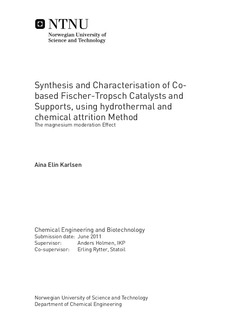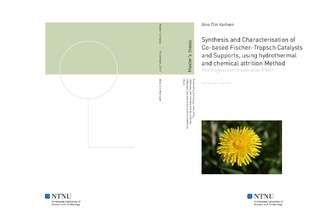| dc.description.abstract | Magnesium modification at different calcination temperatures of γ-alumina supports for cobalt Fischer-Tropsch catalysts was investigated. Support modification and catalyst preparation were performed by applying the incipient wetness impregnation method and resulted in supports containing 7,5 wt. % Mg and catalysts containing 12 wt. % Co and 0,5 wt. % Re. Selected support samples have in addition been promoted with 2 wt. % Al post magnesium modification, while others have been treated hydrothermally with water at 300 °C and 30 bar. The modified supports and the corresponding catalysts have been characterized by N2 adsorption, H2 chemisorption, X-ray diffraction and Fischer-Tropsch synthesis analysis in a dual isotherm fixed-bed unit at 20 bar, 210 ± 0,5 °C and H2/CO = 2,1.
It was established that high temperature calcination of magnesium modified γ-alumina leads to a support material consisting of crystalline α-alumina and MgAl2O4 spinel.α-alumina formation was intensified by the addition of extra aluminium post magnesium impregnation. For the low temperature calcined magnesium modified γ-alumina supports only γ-alumina was detected, and for the medium temperature calcined supports only MgAl2O4 spinel was detected. Hydrothermal treatment with water appeared to induce boehmite formation in the magnesium modified support material.
High temperature calcination led to low surface areas, small pore volumes and large pore diameters and magnesium modification does not have the ability to counteract this effect. High to medium temperature calcination resulted in larger surface areas, indicating that the collapse of pore structure to a certain degree is counteracted by introducing a 2-valent metal in the support material. A small decrease in surface area was observed upon addition of extra aluminium due to the initiating effect of extra aluminium addition to form α-alumina.
Both the low temperature and the high temperature calcined magnesium modified alumina supported cobalt/rhenium catalyst were essentially inactive for the Fischer-Tropsch synthesis. The medium temperature calcined samples displayed relatively low activity as well.
Increased C5+ selectivity was observed accompanying an increase in CO conversion and an increase in C5+ selectivity was observed upon magnesium modification of the γ-alumina support compared to the standard when MgAl2O4 spinel and/or α-alumina were present. The effect of increased surface acidity was an increase in C5+ selectivity at the expense of C4. It appears that magnesium moderation does not cause any changes in methane selectivity. | |

